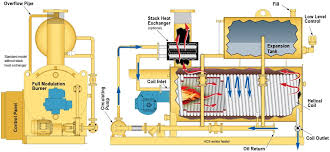
Août . 21, 2024 04:49 Back to list
Ideal Pressure Levels for Hot Water Boiler Efficiency and Safety
Understanding Normal Pressure for Hot Water Boilers
Hot water boilers are essential components in numerous residential and commercial heating systems, providing the necessary warmth for spaces and ensuring comfort during colder months. Understanding the normal pressure range for these boilers is crucial for safe and efficient operation. This article will delve into the significance of water pressure in hot water boilers, the ideal pressure levels, and the implications of operating outside those norms.
What is Boiler Pressure?
Boiler pressure refers to the pressure of the water inside the boiler, which is necessary for the hot water system to function properly. This pressure is measured in pounds per square inch (psi) and is crucial for the effective circulation of hot water throughout the heating system. Maintaining the correct pressure not only ensures optimal heating but also enhances the longevity of the boiler.
Normal Pressure Range
For most residential hot water boilers, the normal operating pressure typically ranges from 12 to 25 psi when the system is cold and can rise to about 30 psi when the system is heated and pressurized. It’s essential to consult the manufacturer’s specifications, as pressure requirements may vary based on the design and capacity of the boiler.
Importance of Maintaining Correct Pressure
1. Safety One of the primary reasons for maintaining normal boiler pressure is safety. If the pressure rises too high, it can lead to dangerous situations, including a risk of explosion. Most modern boilers are equipped with pressure relief valves that automatically release excess pressure to prevent such incidents.
2. Efficiency Proper pressure aids in the efficient circulation of hot water. When the pressure is too low, the boiler might not circulate hot water effectively, resulting in poor heating performance and increased energy bills.
normal pressure for hot water boiler

3. Component Integrity Operating within the designated pressure range prolongs the lifespan of the boiler components. High-pressure conditions can strain parts like pipes and valves, leading to leaks or failures, while low pressure can result in insufficient heating and can cause the boiler to work harder, ultimately shortening its lifespan.
Consequences of Low and High Pressure
- Low Pressure If the system pressure drops below the normal range (usually below 12 psi), it can lead to inadequate heating, as the boiler struggles to circulate hot water. Additionally, low pressure may cause air to enter the system, leading to air locks that disrupt the flow of water. Homeowners might notice radiators not heating properly or cold spots in their homes.
- High Pressure On the other hand, if the pressure exceeds 30 psi, safety mechanisms will kick in. The pressure relief valve will release water to prevent pressure-related damage. Continuous high-pressure readings can indicate underlying issues, such as a malfunctioning expansion tank or an overly aggressive filling valve.
Monitoring and Maintenance
Regular monitoring of boiler pressure is essential for ensuring efficient operation. Homeowners should check the pressure gauge on their boiler routinely, ideally once a month. If any anomalies are observed, such as a significant drop or spike in pressure, it is advisable to consult with a professional technician. Routine maintenance, including checking valves, pressure relief systems, and overall system integrity, helps maintain optimal pressure levels and ensures safe operation.
Conclusion
In summary, understanding the normal pressure for hot water boilers is fundamental for safety, efficiency, and longevity. By maintaining the appropriate pressure levels, homeowners can ensure their heating systems operate smoothly and effectively, providing the comfort needed during colder months. Regular checks and maintenance, along with awareness of the implications of pressure fluctuations, contribute significantly to a well-functioning hot water boiler system.
-
High-Efficiency Commercial Oil Fired Steam Boiler for Industry
NewsJul.30,2025
-
High-Efficiency Biomass Fired Thermal Oil Boiler Solutions
NewsJul.30,2025
-
High Efficiency Gas Fired Thermal Oil Boiler for Industrial Heating
NewsJul.29,2025
-
High-Efficiency Gas Fired Hot Water Boiler for Sale – Reliable & Affordable
NewsJul.29,2025
-
High Efficiency Biomass Fired Hot Water Boiler for Industrial and Commercial Use
NewsJul.29,2025
-
High-Efficiency Biomass Fired Hot Water Boiler for Industrial Use
NewsJul.28,2025
Related PRODUCTS






















